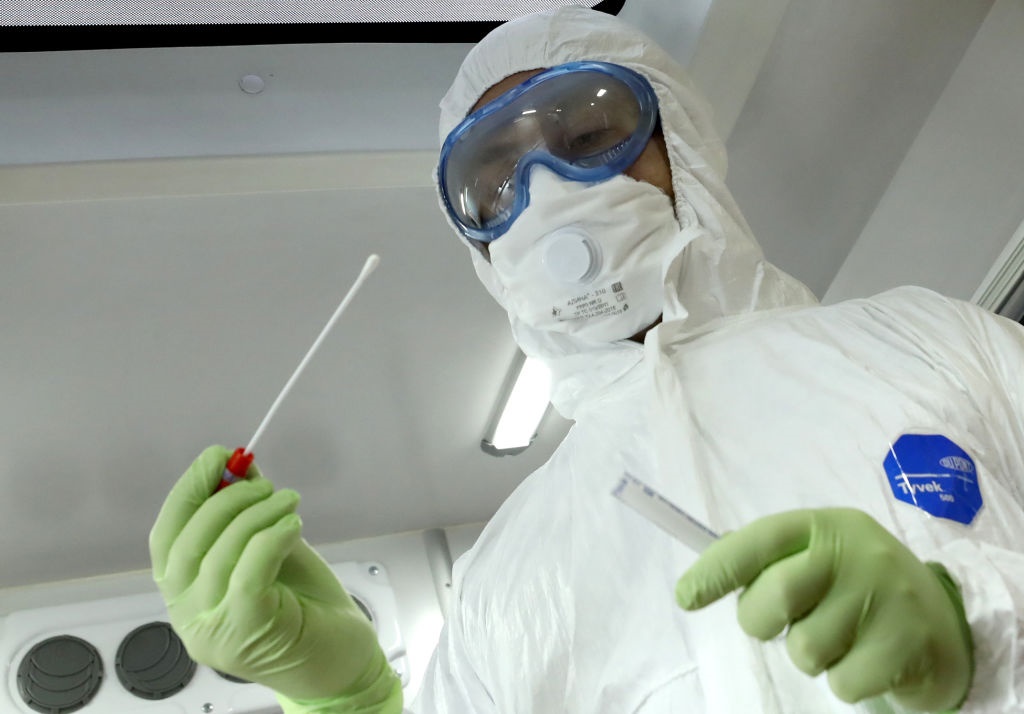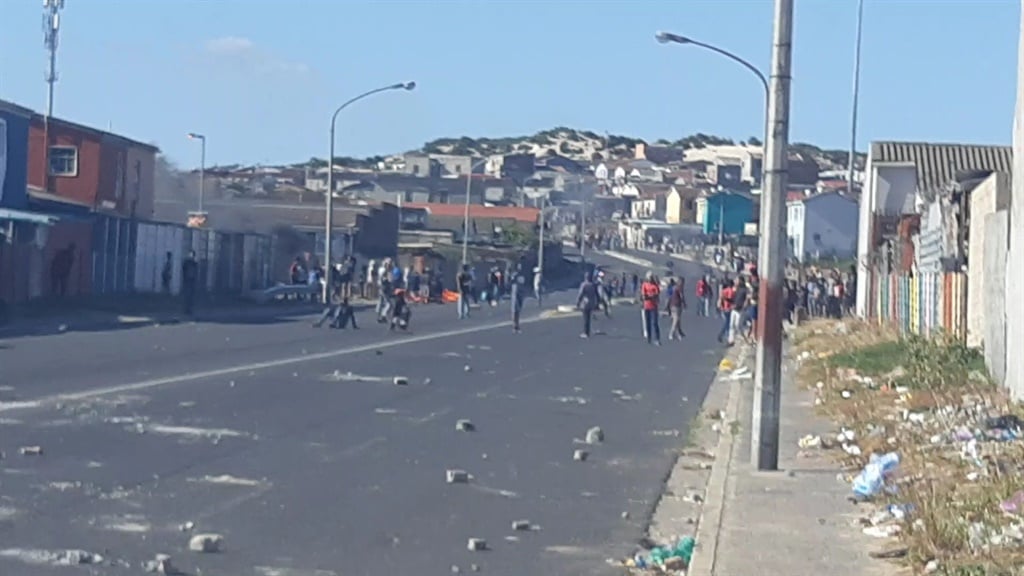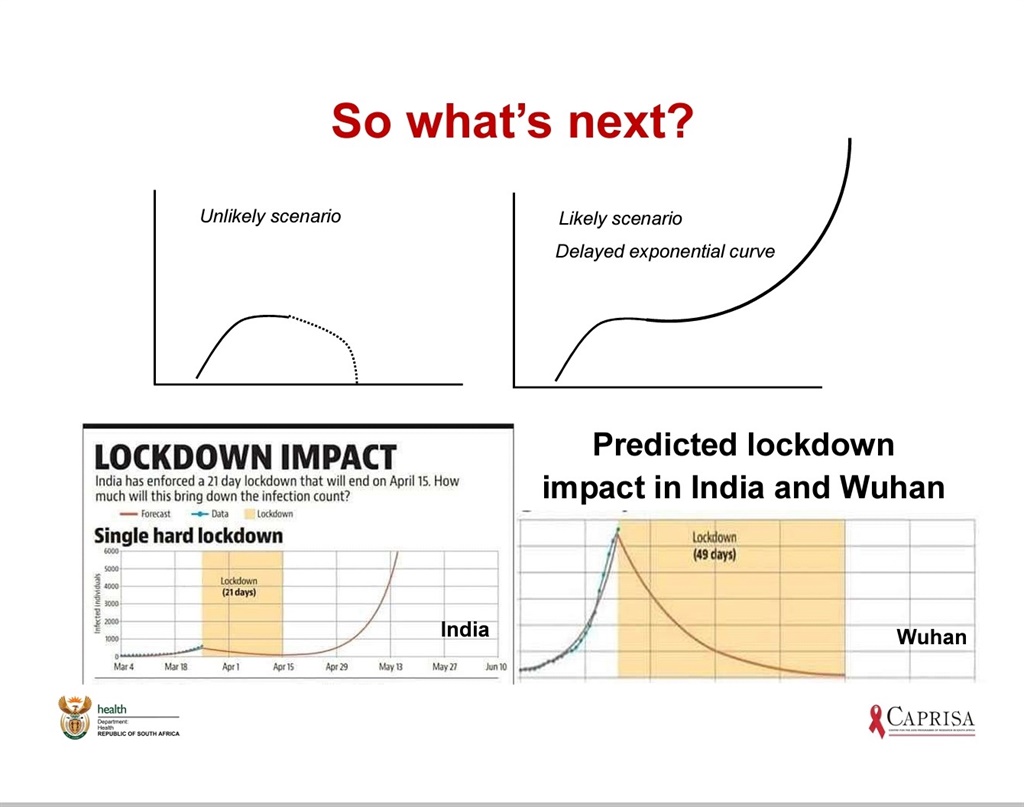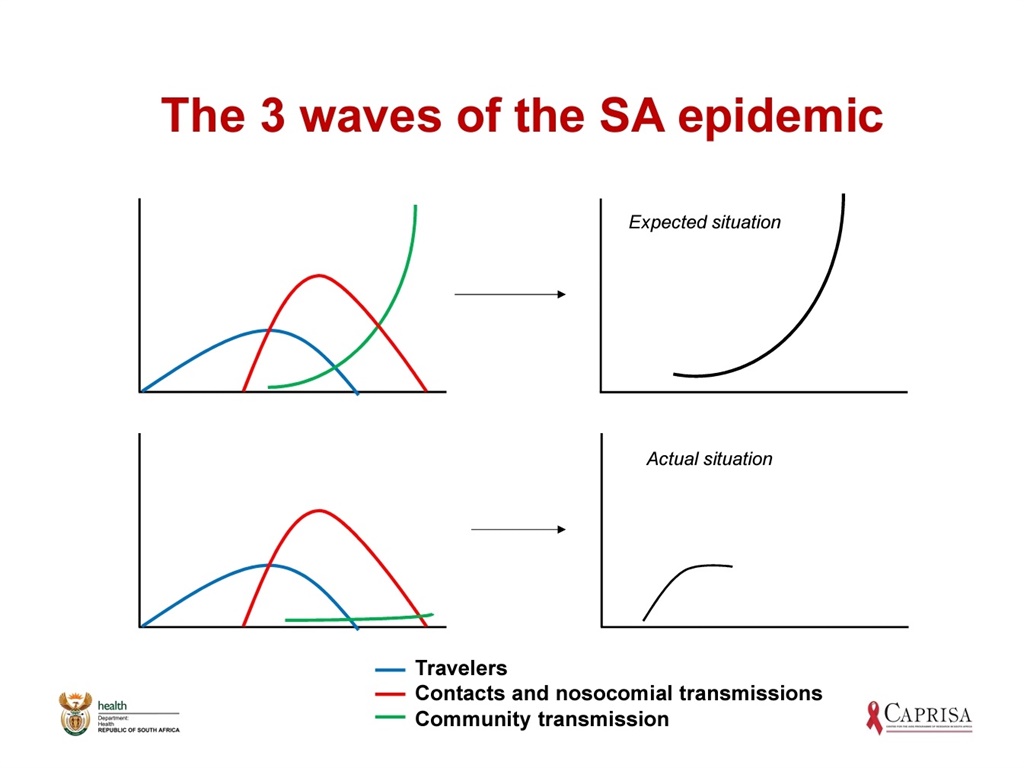2020-04-16 19:30
Stay up to date with the latest news, views and analysis as the number of coronavirus cases in SA increases.
RESOURCES
CORONAVIRUS FAQs | All your questions answered
SPECIAL HUB | Bored? Hungry? Fed up with the kids? We have got you covered during the lockdown

Last Updated at
Share
The Western Cape has 675 cases, 13 deaths and 205 recoveries.KwaZulu-Natal has the highest number of fatalities at 20, with 539 cases and 96 recoveries.
The Eastern Cape recorded four deaths and Limpopo one – both provinces its first deaths.
There are 220 cases in the Eastern Cape and nine recoveries.In Limpopo, there are 26 cases and 18 recoveries.
The recovery rate in the Free State is 71 out of 98 infections. That province has four deaths.
The remaining provinces – North West, Mpumalanga and the Northern Cape – have no deaths and 10, nine and six recoveries respectively.
The North West has 24 confirmed cases, Mpumalanga 22 and the Northern Cape 16.
Share
The big news coming out of the media briefing held by ministers in various departments is that the lockdown will not continue in its current form and that it will be “gradually lifted”.
“The lockdown cannot be stopped abruptly,” said Cooperative Governance and Traditional Affairs Minister Nkosazana Dlamini-Zuma.
What’s more, government is working hard at work to review the “gradual reintroduction of goods and services”.
“We are seeking to avoid a rush of people all at once. We will be making announcements as we conclude and review,” said Trade and Industry Minister Ebrahim Patel.
The full list of amended regulations can be accessed on www.gov.za.
(GCIS)


Statement of the Monetary Policy Committee 14 April 2020
…
Intergovernmental Fintech Working Group releases a position paper on crypto assets
…
News24.com | LIVE | Mistakes will be made as we deal with the coronavirus – Professor Karim

International Covid-19 wrap: Millions of children face measles risk, Taiwan sees no new infections
More than 123 920 people have died worldwide from the coronavirus in 193 countries and territories, according to an AFP tally at 19:00 GMT on Tuesday based on official sources.
There have been 1 961 950 reported infections since the virus emerged in China in December.
The United States has the most deaths of any country with 24 737 fatalities and 592 743 reported infections.
Italy follows with 21 067 deaths, Spain with 18 056, France 15 729 and Britain 12 107.
In Italy, where a strict lockdown has been extended to May 3, most bookshops keep their doors closed despite being allowed to reopen by the government, following decisions by their regional authorities or of their own choice.
Austria on Tuesday reopened small shops and public gardens.
Iceland says it will begin to gradually relax restrictions from May 4, while the Czech government introduces a plan to ease its lockdown measures.
China says it has approved clinical trials for two more experimental vaccines to combat the novel coronavirus.
Pharmaceutical giants Sanofi and GlaxoSmithKline say they will join forces to work on a coronavirus vaccine they hope will enter clinical trials this year, potentially making it available in the second half of 2021.

News24.com | More arrests for lockdown looting and protests, cops in court over bootleg booze

A wave of looting in a Cape Town suburb culminated in the arrest of four people, and in a different part of the city, three others were arrested for allegedly throwing stones at police and law enforcement officers.
Police spokesperson Brigadier Novela Potelwa said the four people, aged 21 to 24, were arrested after a group of about 16 people descended on a shop in Gatesville and stole groceries and five cash registers full of money.
LIVE | All the latest coronavirus and lockdown updates
Further away, in Tafelsig, Mitchells Plain, a group of people used burning tyres and smouldering mattresses to block parts of AZ Berman Drive to draw attention to a complaint they had about what they regarded as the unfair distribution of free groceries.
Police spokesperson Captain FC van Wyk said the group of people started throwing stones when police arrived to investigate.
According to reports, residents of Tafelsig East were upset that a councillor had handed food parcels to Tafelsig West residents on Monday, police said.
Cases of failing to be confined to residences were opened for investigation in terms of the lockdown regulations under the national Disaster Management Act.
Potelwa said three people were arrested for public violence during the Tafelsig standoff.
She warned that police would take action against people who caused unrest.
In terms of the lockdown regulations, only essential service workers are allowed to operate. Everybody else has to stay home unless they need to go out to get essential items, such as medicine or groceries.
The lockdown has left many families without an income.
Police officers themselves were arrested this past week – seven were caught in Bonnievale for allegedly trying to break into a booze shop.
They were each granted bail of R5 000 on Tuesday. They face charges of defeating the ends of justice, theft, the unauthorised use of a motor vehicle, dealing in liquor and violating Disaster Management Act regulations.
They are scheduled to return to court on 24 June.
Two police officers and a Spar owner in Strand were also arrested after police allegedly tried to buy booze from the Spar owner in contravention of lockdown regulations. They are due back in court on Friday.
A 36-year-old man accused of raping an 18-year-old woman at the Strandfontein tent city for the homeless also appeared in court on Tuesday. Bail was set at R2 000.
He is expected to return to court on 14 May.
Stay healthy and entertained during the national lockdown. Sign up for our Lockdown Living newsletter. Register and manage your newsletters in the new News24 app by clicking on the Profile tab
MPC briefing with Market Analysts
Monetary Policy Committee cuts the repo rate by 100 basis points
…
News24.com | Three teenage girls believed to have drowned at Eastern Cape beach

Three teenage girls are believed to have drowned when they went for a swim at Cebe beach in Centane in the Eastern Cape on Saturday.
READ | Lifeguard, 7, lauded for diving into action to save boy, 4, from drowning in pool
According to Eastern Cape police spokesperson Captain Jackson Manatha, the girls were last seen on Saturday at around 14:00.
They were believed to have drowned. East London police divers conducted a search but the girls were not found.
Police divers resumed their search on Sunday.
“Centane police are appealing to Cebe Village communities to contact them on 073 288 0340 if they see the bodies,” Manatha said.
The girls are two sisters aged 14 and 13, and their friend aged 14.
According to the Stats SA Mortality and Causes of Death report, drownings made up 4.1% (1 411 cases) of deaths due to external causes of accidental injury in 2016.

News24.com | SA unlikely to avoid ‘wildfire’ spread of Covid-19, but lockdown bought time – top scientist

South Africa will likely not be able to prevent the exponential spread of Covid-19, with the full sweep of the disease to probably hit the country later this year.
And although South Africa acted much earlier than other nations in identifying the virus and implementing measures to halt its spread, it has only bought the country time to prepare for what scientists are calling “almost inevitable”: a dramatic rise in infections.
This is according to Professor Salim Abdool Karim, the chairperson of Health Minister Zweli Mkhize’s Covid-19 advisory group, who addressed a media briefing alongside other scientists on Monday night. It was the first briefing with the country’s top scientists since the coronavirus was first reported in South Africa on 5 March.
Karim was joined by among others Professor Glenda Gray, the chairperson of the Medical Research Council, Professor Koleka Mlisana, a microbiologist from the University of KwaZulu-Natal, and Professor Brian Williams, an epidemiologist formerly with the World Health Organisation.
“What we have managed to do, is delay an exponential curve,” Karim said. “It is a difficult truth, but can we avoid the exponential spread? No… unless we have a mojo that other countries don’t have.”
He also explained:
- The lockdown could not be ended too abruptly, as we risk squandering gains made in the past few weeks and returning to an exponential rise in cases.
- A decision on a further lockdown extension would be informed by the rate of spread seen in average new daily cases between 10 and 16 April, which they were 95% sure would remain between 40 and 80 cases. Above 90 cases a day calculated over a week would result in a lockdown extension.
- Cases reported as confirmed today, were actually an infection that took place two weeks ago and infected persons are contagious days before they show symptoms.
- Plans were being developed for a systematic end to the lockdown, which would focus on not placing high-risk people in close contact with low-risk people.
- Testing criteria, restricted to people only with certain symptoms, has been widened in the past few weeks to pick up more cases, together with a significant increase in testing capacity.
- Major concern rested on Johannesburg, Cape Town and eThekwini (Durban), where a large outbreak was most likely to occur due to dense population numbers.
News24 reported on Sunday that government projections, presented to the Parliamentary health portfolio committee showed this peak infection scenario had been pushed back to September.
“No one in the world has encountered this virus. We have no immunity, no vaccine, no treatment. We are all at risk.
“As soon as the opportunity arises for this virus to spread, it will go back to the exponential curve,” Karim said.
Importantly, lockdown and other initial measures had bought valuable time to prepare and attempt to contain hotspots.
Karim, a world-renowned figure in the field of HIV research and epidemiology, is the chairperson of a Ministerial Advisory Committee (MAC) made up of more than 20 professors, doctors and scientists who advise Mkhize and the National Command Council chaired by President Cyril Ramaphosa.
Karim was speaking at a media briefing on Monday night, scheduled to shed light on the technical aspects of government’s response.
Experts from the MAC and Mkhize explained what they expected in the coming weeks and months, and detailed measures taken so far and what had informed decision-making.
Karim and Mkhize steered clear of any projections on the numbers of people they expected to be infected at the peak of the virus, and how many people were expected to need hospitalisation or die from Covid-19.
Unique trajectory
Karim explained that while concern existed over whether testing was adequate in poorer communities and that many cases lay undetected in those areas, it was far more likely that early and decisive interventions had curbed the spread of Covid-19.
“We expected to see an exponential growth in our epidemic. But this didn’t happen,” he said.
Testing capacity had increased, and as such dispelled these concerns for the most part.
Professor Cheryl Cohen, the co-head of the National Institute for Communicable Diseases’ (NICD) Centre for Respiratory Diseases and Meningitis, explained that the country’s early cases were largely imported.
Imported cases refer to travelers who were infected abroad, who returned home and then passed the virus on to those they came into contact with.
Karim explained that these two groups – the travellers on the one side and the people they infected on the other side – were expected to pass the virus on to their communities.
“When it [Covid-19] enters a community, it spreads like wildfire,” Karim said.
“For some reason, those two groups did not lead to this. We still have community transmissions, but it’s at a low level.”
As the local epidemic curve flattened and plateaued to a lower average number of daily new cases, testing capacity for the 80% of the population who do not have medical aid had been ramped up.
He highlighted that testing numbers were still too low.
Stages of response
According to Karim, government’s response was informed by eight key strategic responses planned and executed from early on.
The first four stages had unfolded in weeks past, while the next four stages would be informed by the data over the next two weeks.
- Stage 5, identifying hotspots to enable intervention quickly was key, and massive teams of health workers on the ground were essential to this.
- Stage 6 involved preparing the availability of medical care for the time when peak infection arrived, which had started some weeks ago. This included finding and building field hospitals where patients could be triaged before flooding hospitals. Karim said there was major concern over the readiness and availability of the healthcare system to deal with the number of patients who would require care.
- Stage 7, which Karim said he understood people did not want to speak about, was ensuring burial capacities could meet demand and preparing citizens for the psychological and social impact of large numbers of casualties.
- Stage 8 entails ongoing vigilance and surveillance, including testing campaigns at mines, schools and large companies to ensure a second wave epidemic did not occur after the initial outbreak is contained.
Stay up to date and stay healthy. Subscribe to Health24’s Daily Dose newsletter for important updates on the spread of the coronavirus. Register and manage your newsletters in the new News24 app by clicking on the Profile tab.
News24.com | WRAP | Fearing a killer virus, fearing winter and fearing the lockdown

Some news on the global front now:
Johson: Things could have gone either way
British Prime Minister Boris Johnson said on Sunday that “things could have gone either way” in his struggle against coronavirus in a video recorded after he left hospital following intensive care treatment.
“I hope they won’t mind if I mention in particular two nurses who stood by my bedside for 48 hours when things could have gone either way,” he said, as he praised his medical team at London’s St Thomas’ Hospital.
Spain ‘far from victory’ in virus fight – PM
Spain is “far from victory” in its fight against the coronavirus, Prime Minister Pedro Sanchez warned on Sunday as the country’s death toll from the pandemic rose again after falling for three days in a row.
The nation registered 619 new deaths in the last 24 hours from Covid-19, bringing the death toll to 16 972, the health ministry said, the highest in the world after the United States and Italy. The toll was 510 on Saturday, the lowest since March 23.But the number of new infections continued its slow, rising by 4 167 to 166 019, a smaller increase than was recorded on Saturday.
Although health chiefs say the pandemic has peaked, they have urged the population to strictly follow a national lockdown which was put in place on March 14 in order to reduce the spread of the virus.
“We are still far from victory, from the moment when he will recover normality in our lives,” Sanchez said during a televised address.
“We are all keen to go back out on the streets… but out desire is even greater to win the war and prevent a relapse,” he added.His comments come as Spain braced for the reopening of some sectors of its economy, with some factory and construction workers set to return to work on Monday.
US could start reopening in May, top virus advisor says
The United States may be ready to start gradually reopening next month, the government’s top infectious diseases expert said Sunday, as signs grew that the coronavirus pandemic is peaking.
President Donald Trump had earlier wanted the world’s largest economy to be “raring to go” by Sunday, but most of the country remained at a standstill and churches took Easter celebrations online to halt the spread of the virus that has killed more than 20 000 people in the US.
Trump has cast the decision on when to ease the lockdown as the biggest of his presidency as he faces competing pressures from public health experts and businesses along with some conservative allies who want a swift return to business as usual.
Anthony Fauci, the veteran pandemic expert who has quietly sought action to stem infections, said in a televised interview that parts of the country could begin easing restrictions next month – but was cautious.
Tourists forced to write ‘sorry’ 500 times over India lockdown breach
Ten foreigners who broke a coronavirus lockdown in an Indian town made famous by the Beatles, were forced to repent by writing “I am so sorry” – 500 times, officials said Sunday.
The nationwide lockdown was imposed near the end of March, with residents permitted to leave their homes only for essential services such as buying groceries and medicine.
The travellers – from Israel, Mexico, Australia and Austria – were caught taking a walk in Rishikesh, where the Beatles sought spirituality at an Ashram in 1968.




